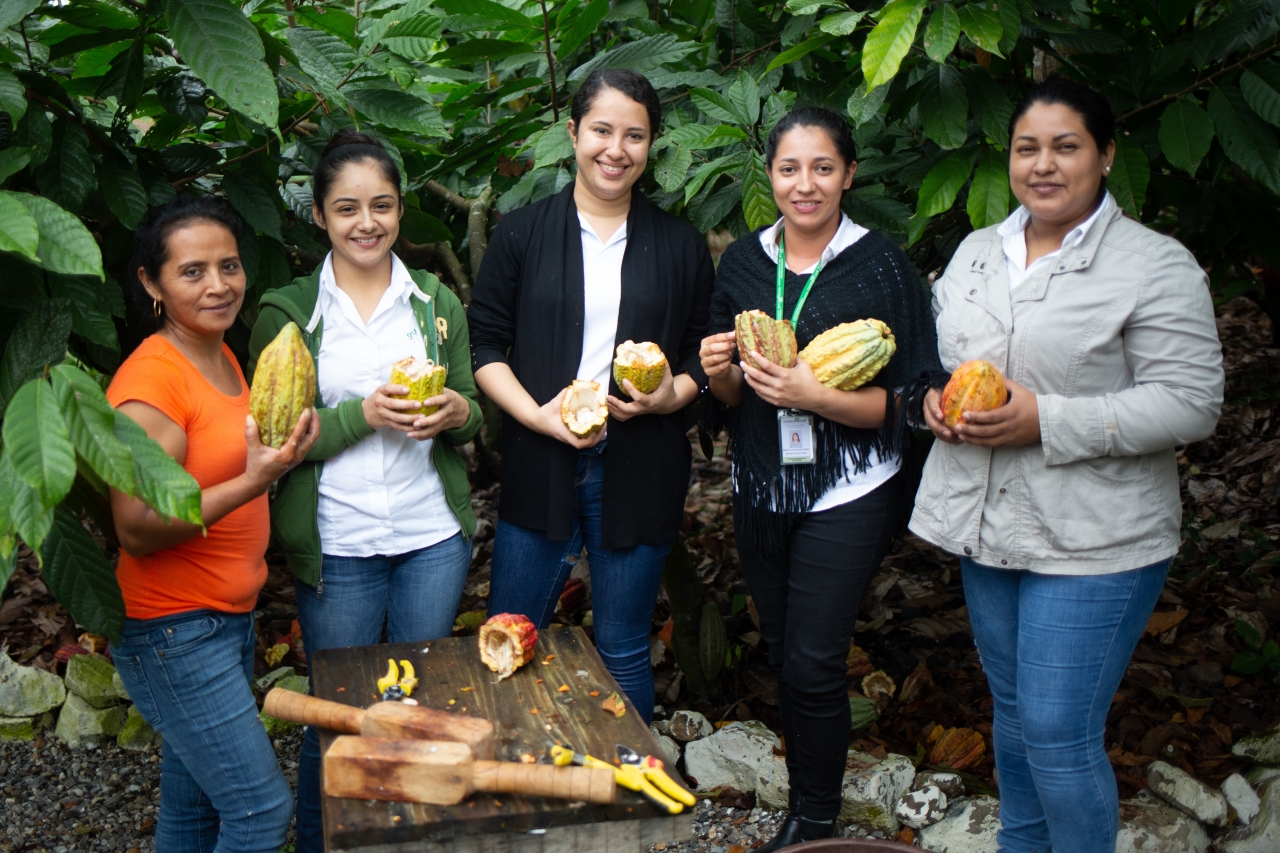Leading Businesses Sign Fairtrade Pledge to Support 1.8 Million Farmers Calling for Climate Justice
The pledge is part of Fairtrade’s Be Fair With Your Climate Promise campaign encouraging world leaders and businesses alike to take urgent action in support of farmers
Published 10-08-21
Submitted by Fairtrade America

WASHINGTON , October 8, 2021 /CSRwire/ - Ben & Jerry’s, Tony’s Chocolonely, and UK retailers Co-op, M&S and Waitrose, are among a group of Fairtrade business partners worldwide pledging to support Fairtrade farmers in their call for climate justice in the run-up to the COP26 climate summit in Glasgow, UK, this November.
The companies have signed a business pledge urging world governments and leaders to listen to the voices of farmers – the people who grow the world’s food and other essential goods in low-income, climate-vulnerable nations – as the farmers call for urgent action at COP26.
In the pledge, developed by Fairtrade as part of its Be Fair With Your Climate Promise campaign, the companies commit to take accountability for their own climate impact. They also commit to work alongside Fairtrade to protect and invest in the resilience and green transition of global food supply chains in the face of the climate crisis.
As companies sourcing from Fairtrade producers in Africa, Asia, Latin America and the Caribbean, the signatories to the pledge see the climate crisis hitting the people in their supply chains disproportionately hard. Increasingly volatile weather is damaging crops, harming livelihoods for farming communities, and making crop production more unpredictable.
With approximately three weeks until COP26 takes place in Glasgow, UK, governments must “set ambitious, science-based rules and targets which do not allow unscrupulous businesses to ignore the damage they are causing to the planet, and which encourage responsible business to do more,” the pledge states.
Cheryl Pinto, Global Values Led Sourcing Manager, Ben & Jerry’s, says: “This is an issue of justice, so together with our fans and Fairtrade we call on world leaders to take urgent action. 1.5°C warming will disproportionately and negatively impact disadvantaged and vulnerable populations. This means that the people who grow our food in climate vulnerable nations, where they are already suffering the consequences of climate change yet did the least to cause it, face a bleak, daunting future as their livelihoods are increasingly threatened. The $100 billion climate finance promise must be met and delivered, so that it reaches farmers, strengthens their resilience, and supports a just, fair future for all.”
Other Fairtrade signatories to the pledge include Bewleys, Cafédirect, Clipper, Coliman, Cru Kafe, Equal Exchange, Greggs, Kaladi, Liberation Nuts, Matthew Algie, Navitas and People Tree. Together, all the signatories commit to four key areas of action as part of their ongoing work in their international supply chains, and they call on other businesses to do likewise:
- To pay fair prices to producers – farmers and workers should not have to choose between tackling poverty and building resilience to the climate crisis. ‘Our Fairtrade commitments are critical to achieving this,’ say the companies.
- To be long term partners with farming communities, listening to the experience of farmers, sharing their own expertise and investing in the urgent transitions farmers need. They will back a shift in food production and supply to one that is resilient to the changing climate, including backing nature-based solutions. They will support farmers as they work together to cut the emissions embedded throughout their supply chains.
- To “know and show” their climate impact, by measuring carbon emissions embedded in their supply chains, assessing the climate risks faced at farm level, and publishing the results. The companies say they want to raise awareness about the challenges and the practical solutions, setting a high bar for other businesses.
- To speak out, calling in public and private for Governments to set and deliver ambitious targets for emissions reduction and climate finance which puts farmers and agricultural workers first.
The business pledge follows the publication of an open letter from 1.8 million Fairtrade farmers and workers across Africa, Asia, Latin America and the Caribbean earlier this week. The letter warns governments that their lack of action is threatening farmers’ livelihoods and global food supplies, and deepening poverty. Furthermore, the letter calls out the broken promises from world leaders. It demands that the promised $100 billion climate finance is not only paid, but that those funds reach farmers and workers directly to ensure they can withstand the growing challenges of climate change, including by planting more trees and investing in more resilient crops.
Frits Snel, Tony’s Chocolonely Country Manager, US, said: “We can’t achieve social justice on a broken planet. And climate injustice often means the ones actively contributing to climate change feel its repercussions least. This reinforces the structural inequality of global industry and economy. Practically speaking, this also means cocoa farmers are already feeling the consequences of climate change. We’re proud to be carbon neutral, to work with farmers in protecting the land and to produce plastic free packaging. But there’s certainly more to be done. We aim to keep raising the environmental bar together with farmers and our partners at Fairtrade.”
British convenience retailer Co-op recently announced a commitment in their recent Climate Justice for People and Planet report to continue to spend more than 0.7% of their pre-tax profit on international aid and has joined forces with Fairtrade Africa and Fairtrade Foundation to support producers combating the effects of climate change.
Jo Whitfield, Food CEO from the Co-op said: “We are reliant on the global food system for the food we enjoy. However, the reality is that for many of our suppliers the impact of the climate crisis is immediate and pressing. That’s why we’ve been calling on governments to ensure producers in low-income countries receive support to cover the cost of adapting to climate change and transitioning to low carbon production, and on businesses to play their part too.”
Speaking on behalf of the global Fairtrade campaign, Mary Linnell-Simmons, Director of Marketing and External Relations at Fairtrade America, says: “We welcome support for farmers from these forward-looking brands and retailers. It’s imperative that businesses take a lead by earnestly committing themselves to supporting the farmers in their international supply chains. We call on other businesses to do the same. It is more important than ever that we listen to our farmers, raise their voices and ensure governments and businesses alike act now!”
For more information about Fairtrade’s Be Fair With Your Climate Promise campaign is visit: www.fairtrade.org.uk/be-fair
-Ends-
For more information or interviews, contact Martine Parry, martine.parry@fairtrade.org.uk
Notes to Editors
About Fairtrade
Fairtrade changes the way trade works by putting farmers and workers first. That means better prices, decent working conditions and more trade power for small-scale producers. Leading by example, Fairtrade has producers represented in 50% of its governance. Fairtrade International is an independent non-profit organization representing 1.8 million farmers and workers worldwide. It owns the FAIRTRADE Mark, a registered trademark appearing on more than 30,000 products, which is the most recognised and trusted sustainability label in the world. Fairtrade International and its member organisations collaborate with businesses, engage shoppers, activate civil society, and enable producers to take control in order to bring about a fair, sustainable future — a future rooted in social justice. www.fairtrade.net

Fairtrade America
Fairtrade America
Fairtrade America works to rebalance trade, making it a system rooted in partnership and mutual respect rather than exploitation. It's about businesses, shoppers, farmers and workers all working together so we can all experience the benefits of trade. Fairtrade America is the U.S. branch of Fairtrade International, the original and global leader in fair trade certification with more than 30 years of experience working for fair trading practices in more than 30 countries across the globe. A non-profit 501(c)3 organization, Fairtrade America is part of the world's largest and most recognized fair trade certification program — part of a global movement for change. Learn more at fairtradeamerica.org, and by connecting with Fairtrade America on Facebook, Instagram and LinkedIn.
More from Fairtrade America

